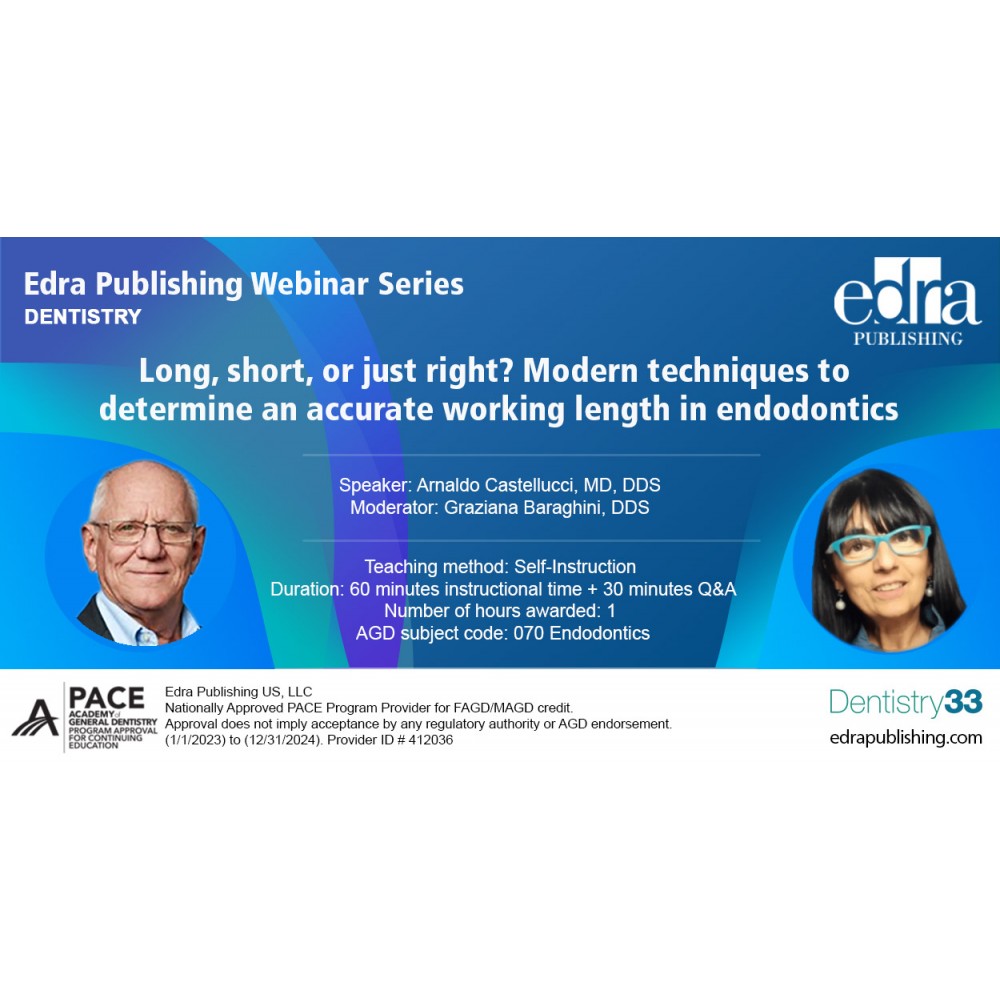



Successful endodontic treatment depends on completely removing the contents of the root canal system and sealing all communication pathways between the endodontium and periodontium. In other words, the result of endodontic treatment must be the same as obtained with the extraction of a compromised tooth.
First release 1.1.2023 - Available until 12.31.2023
Therefore, it is evident that knowledge of the endodontic anatomy with all its possible variations and the correct determination of the working length is are critical to not forget even the most minor portions of the root canal system during treatment.
This is because they may harbor pulp remnants that will not necessarily and not predictably retain their vitality (in the case of the vital tooth) or even bacteria (in the case of the necrotic tooth). In either case, the treatment is inevitably condemned to failure.
The methods currently available to the clinician to measure the correct working length are numerous and include tactile sensitivity, radiographic examination, the use of state-of-the-art apex locators, and above all, the constant drying point. The above four methods are not mutually exclusive; they should be used in association.
Each provides the operator with valuable information that will guide the choice in deciding on the correct terminal point to finish the preparation and obturation of the root canal system. During the presentation, a thorough literature review will be conducted, and the various methods will be explained, showing the advantages and limitations of each and the benefits of using them in combination.
Educational Objectives
Specifically, this webinar will:
Educational Path
The webinar is a recording of a live course and consists of two parts.
The first part covers the primary course content via lecture. In the second part, the speaker answers questions received during a live session with participants.
Interaction with the instructor is an essential part of this program, and participants can follow up with the speaker by e-mail at the address provided at the end of the lecture.
ADDITIONAL RELATED WEBINARS/LECTURES:
This webinar is part of an Edraclass of ten webinars in endodontics from Prof. Arnaldo Castellucci:
1 - Long, short, or just right? Modern techniques to determine an accurate working length in endodontics
2 - The endodontic glide path: the secret for the safe use of Rotary NiTi Files
3 - "Next" endo-generation instruments: the use of ProTaper Next
4 – Three-dimensional obturation of the root canal system
5 - Clinical and surgical approach to the presence of two canals in the same root
6 - Nonsurgical repair of iatrogenic perforations
7 - Endodontic surgery or micro-surgical endodontics? Part I
8 - Endodontic surgery or micro-surgical Endodontics? Part II
9 - Digital Endodontics. The use of CBCT in nonsurgical and surgical endodontics
10 - The use of MTA in nonsurgical endodontics: direct pulp capping and treatment of immature apices with the "Apical Barrier Technique"
Each webinar can be purchased individually or as an Edraclass package (10 webinars).
Course type
Online course
Self-instruction
60 minutes lecture + 30 minutes Q&A
1 CE credit
AGD Code: 070 Endodontics
Audience
Dentists - Knowledge of the endodontics foundation is recommended prior to attending this course.
Faculty
Speaker: Arnaldo Castellucci, MD, DDS
Arnaldo Castellucci graduated in Medicine and Surgery at the University of Florence (1973) and specialized in Dentistry and Prosthodontics at the same University (1977). Between 1978 -1980 he attended Continuing Education in Endodontics courses at the Boston University School of Graduate Dentistry with Prof Herbert Schilder.
Since 1979 his professional career has focused on Endodontics.
He lives in Florence, where he has his private practice and the Micro-Endodontics Training Center.
Between 1983 -2000 he was a Visiting Professor of Endodontics at the Graduate Dental Course of the University of Siena, and between 2000- 2011 he was a Visiting Professor of Endodontics at the Graduate Dental Course of the University of Specialization in Oral Surgery at the University Federico II of Naples.
He is the Past President of the Italian Endodontic Society (SIE - Società Italiana di Endodonzia), Past President of the International Federation of Endodontic Associations (IFEA), Active Member of the European Society of Endodontology (ESE), and Active Member of the American Association of Endodontists (AAE).
He is a very well-known international lecturer.
He has been the Editor of "The Italian Journal of Endodontics" and "The Endodontic Informer." He is now the Editor in Chief of Endo Tribune, Founder and President of the "Warm Gutta-Percha Study Club." He published articles on Endodontics in the most prestigious Endodontic Journals. He authored the textbook "Endodontics," now available in English.
Research interests: endodontics, micro-endodontics, micro-surgical endodontics.
Moderator: Graziana Baraghini, DDS
Graziana Baraghini is a dentist with over 20 years of experience in the dental field. Passionate about educating patients on the importance of oral hygiene. Committed to providing the best patient care through communication and high-quality service. Experience working with children, adolescents, and those suffering from dental anxiety. She is devoted to remaining current on the latest techniques to provide the highest patient care possible.
Data sheet
Specific References